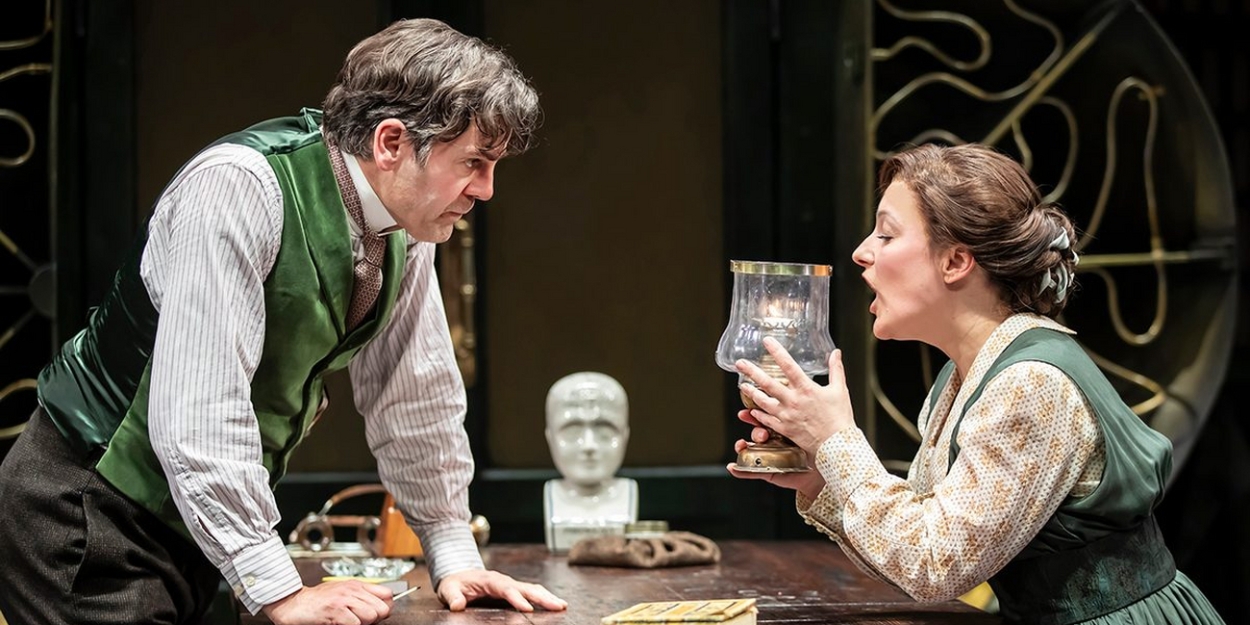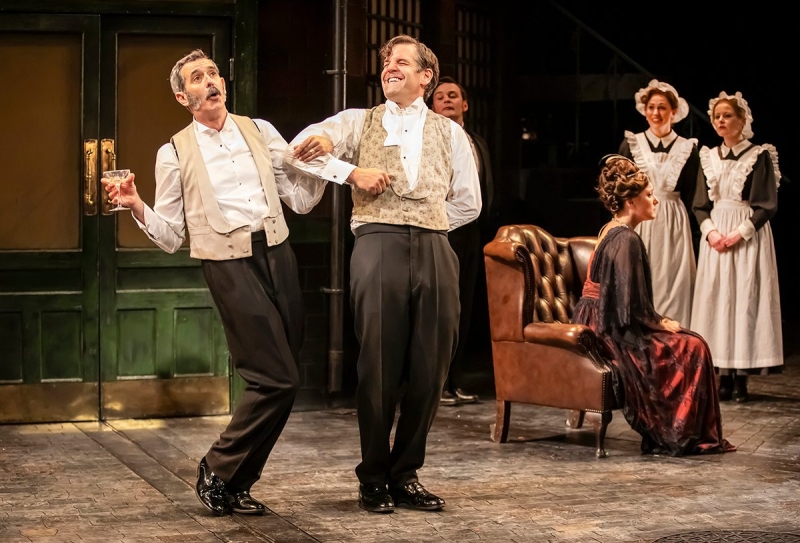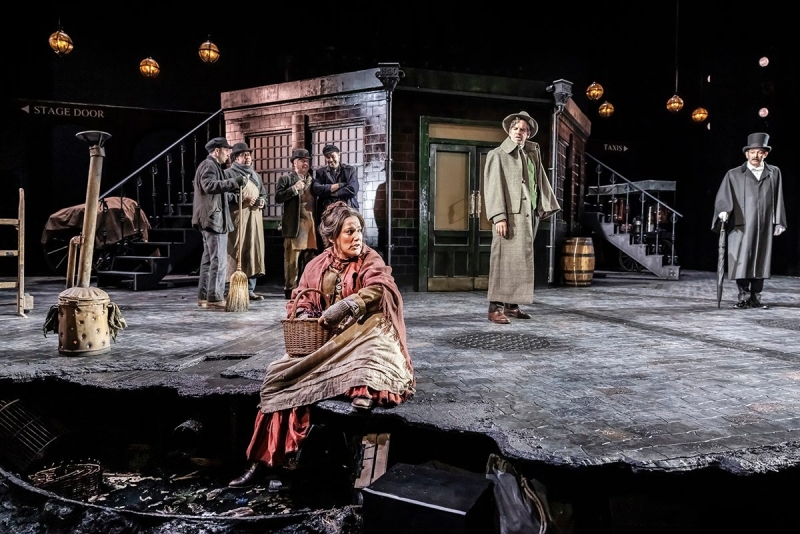Review: MY FAIR LADY, Leeds Playhouse
An all-time great crowdpleaser delivered with panache and skill

 There’s something sticky about the scores of The Great American Musicals. I’m not sure if it’s the Christmas Day broadcasts on BBC1, Two-Way Family Favourites on Radio 2 or a bit of involuntarily heard muzak in a hotel lobby, but, for those of an age who can recall when culture was experienced collectively and not individually, the songs are all there. I suspect it runs rather deeper than that, the men (and occasionally women) who filled Broadway’s houses and beyond from the 1920s to the 1960s found something atavistic in the human soul. Sure we’re only tapping our toes, then singing a bar or two on the bus home, but it can’t just be that can it? These tunes are instantly hard-wired inside our heads.
There’s something sticky about the scores of The Great American Musicals. I’m not sure if it’s the Christmas Day broadcasts on BBC1, Two-Way Family Favourites on Radio 2 or a bit of involuntarily heard muzak in a hotel lobby, but, for those of an age who can recall when culture was experienced collectively and not individually, the songs are all there. I suspect it runs rather deeper than that, the men (and occasionally women) who filled Broadway’s houses and beyond from the 1920s to the 1960s found something atavistic in the human soul. Sure we’re only tapping our toes, then singing a bar or two on the bus home, but it can’t just be that can it? These tunes are instantly hard-wired inside our heads.
Such thoughts came to mind watching James Brining’s new production of a show that sits on the very top tier of musical theatre, Alan Jay Lerner and Frederick Loewe’s My Fair Lady.
It almost didn’t happen. Richard Rodgers and Oscar Hammerstein II had tried to adapt George Bernard Shaw’s Pygmalion and gave it up as a lost cause. Irving Berlin, Cole Porter and Frank Loesser didn’t even get that far. Looking back, we should be grateful that the team that gave us Brigadoon and Camelot did it and did it when they did, because I’m not sure it would be taken on today - but more of that later.

We open on Professor Henry Higgins, like an Edwardian David Starkey, lamenting the English people’s disregard for their own native tongue, droppin’ aitches and awl tha’. He’s particularly exercised by a Covent Garden flower girl hawking her wares in a broad Cockney accent and soon strikes a bet with fellow linguist, Colonel Pickering, that he can take the girl, Eliza Doolittle, and pass her off as a Lady.
Now Shaw’s point was that class is mere artifice, a rigid social structure built on such arbitrary indicators as how one pronounces “Hartford, Hereford and Hampshire”. But it doesn’t come across that way, the misogyny of treating women, particularly working class women, as mere playthings largely overwhelming the satire. Eliza is why we needed Barbie.
Usually, such anachronistic attitudes can be addressed in two ways, three if one counts the nuclear option of not producing the works at all - beware Cancel Culture! Often the director will find a take that ameliorates the worst excesses of a text, giving agency to the erstwhile victims, steering us away from ridicule and condemnation towards the safe haven of empathy and righteous resistance. That can’t work for this show, the relentless denigration of Eliza being so central to Henry Higgins’ character that any attempt to explain it away will hollow him out. Get a full woman and get a shell of a man - or vice versa.
So we’re left with accepting the rough with the smooth, grimacing at the treatment poor Eliza accepts (think The Taming of the Shrew without Kate’s starvation, but with everything else) and wondering, even in 1910, why this bright, resourceful, charismatic woman won’t fight back. I guess if you swim in a sea of systemic prejudice and psychological warfare, it’s hard to raise one’s head above the waterline or even see that there’s fresh air up there.
Polemic over. The strongest element of the show is delivered beautifully. The Orchestra of Opera North is in peak form under the baton of Oliver Rundell, giving full value to such bangers (is that the right word - I think so) as “With a Little Bit of Luck” and “Get Me to the Church on Time”. Hats off too to the Chorus of Opera North who not only fill the stage space (like last winter’s Oliver!, this is a big musical), but also add much to the aural delights. Madeleine Boyd’s costumes are a delight to gaze upon and her set is endlessly adaptable, wittily so in the "Come on, Dover! Move your bloomin' arse!” scene.
John Hopkins is, if anything, a bit too good as the appalling Professor, making Henry Higgins all too believable in his continual disdain - but the man has a speaking voice and, perhaps unusually for this part, a singing voice to die for. Ahmed Hamad nails “On the Street where You Live”, but the soppy suitor Freddy is an underwritten part and Richard Mosley-Evans is all but a Pearly King as Eliza’s boozy and well-named father, Alfred Doolittle. This is not really a show that does nuance.

Of course, much depends on the leading lady, the role that immortalised Audrey Hepburn and nearly immortalised Julie Andrews (she had to wait a year for Mary Poppins having played Eliza in the West End and on Broadway, but not in Hollywood). Katie Bird reins in her full operatic soprano most of the time, thus enhancing its impact when she does release it, but finds the desperation in “Wouldn’t it be Loverly?” a song about the existential threat of poverty, not choccies.
We’re pulling for her from that moment on, but this woman (the age-gap is, thankfully, much less noticeable, with Eliza no teenish ingénue and Professor Higgins well short of Emeritus status) has the all the chutzpah she needs to demand the agency she only really assumes at the very end - or does she? It’s that conundrum - she’s swept off her feet with “I Could have Danced All Night” - and she must be able to read the signs. Her continual insistence that “I’m a good girl, I am” demonstrates that this is hardly her first rodeo with men who may or may not have a libidinous eye on her. Why is she so passive?
That may be your straight middle-class (well, middle-classish) male reviewer speaking though, as there isn’t a huge amount to suggest that Higgins is looking for a wife rather than an auxiliary housekeeper that he can use in order to play dress up and win bets. He is a self-confessed confirmed bachelor after all.
Perhaps none of that matters to its target audience who may adopt a bit of old-fashioned Yorkshire common sense when confronted with such a metropolitan analysis. It’s a traditional story of transformation after all, of a girl seizing her chance when it comes, of an arrogant man getting at least a measure of comeuppance for his presumption. Most of all, we can wallow in the songs, which can’t have been delivered better since Dame Julie sang and Shoulda-Been Dame Audrey lipsynced. And that’s lovely, it really is!
My Fair Lady is at Leeds Playhouse until 29 June
Photo images: Pamela Raith
Reader Reviews
Videos

